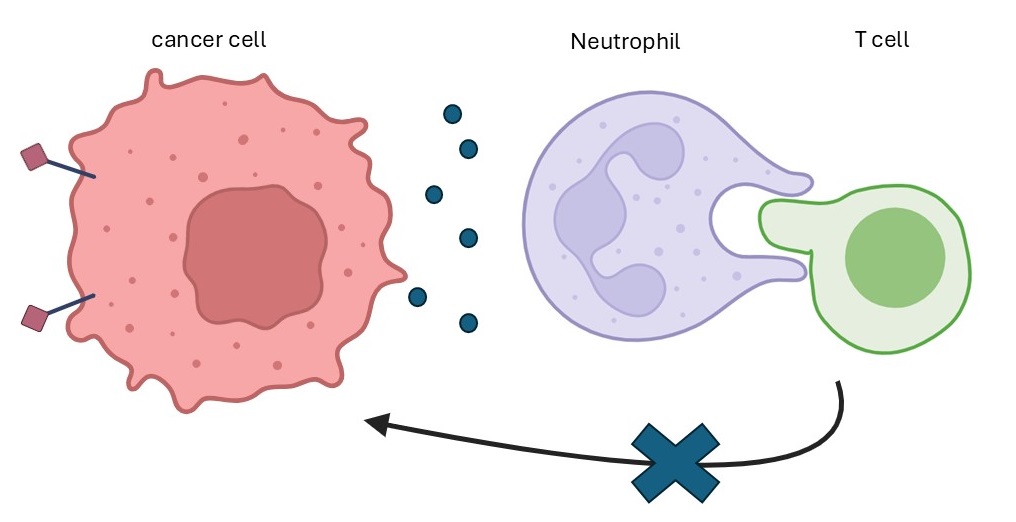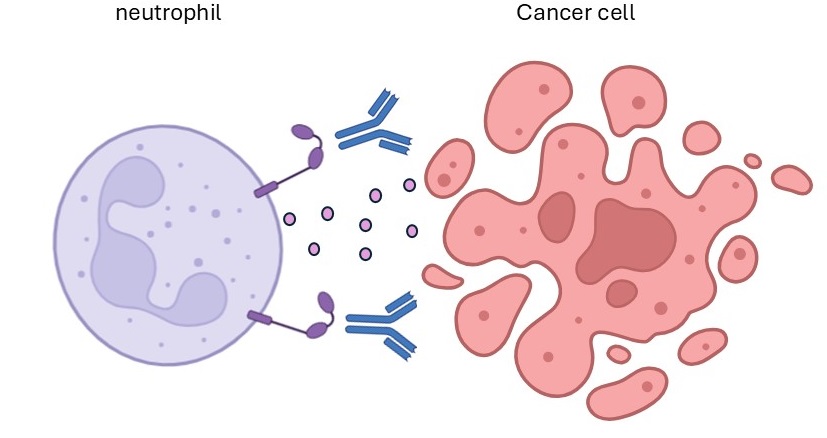Cultured immune cells to combat cancer
NewsA team of scientists from Sanquin is growing neutrophilic granulocytes from stem cells to investigate how to optimize them to attack cancer cells. A deeper understanding of neutrophil function could pave the way for innovative cancer therapies. Additionally, Sanquin aims to develop cultured neutrophils into a new transfusion product for patients. PhD candidate Angela Gankema shares her laboratory work in an engaging video.
A Double-Edged Sword: Neutrophils and Cancer
Neutrophilic granulocytes are immune cells that protect us against microorganisms. Individuals with neutrophil deficiencies have a high risk to suffer from life-threatening infections. Neutrophils are also capable of fighting cancer cells.
Unfortunately, neutrophils can also hinder the destruction of cancer cells. Cancer cells give off signals that prompt the neutrophil to inhibit T cells. These immune cells are then no longer able to effectively attack cancer cells. Angela Gankema is studying how neutrophils transform from cancer-fighting cells to immune-suppressing cells.
 Image: the cancer cell secretes signaling molecules which prompt the neutrophil to inhibit the T cell, which can therefore no longer fight the cancer cell.
Image: the cancer cell secretes signaling molecules which prompt the neutrophil to inhibit the T cell, which can therefore no longer fight the cancer cell.
Cultured neutrophils
Traditionally, neutrophils are isolated from donor blood for research purposes. "A challenging aspect is that neutrophils only survive a few hours outside the body," explains Angela, who’s is doing her research alongside her colleagues Steven Webbers, Fleur van Oosterom and Felipe Rojas-Rodriguez. “This limited lifespan hinders developmental studies. To overcome this, we've developed a method to culture neutrophils from healthy donor stem cells."
A happy coincidence
These cultured neutrophils closely resemble their blood-derived counterparts, efficiently neutralizing pathogens and killing cancer cells. Notably, they lack the ability to inhibit T cells, a potentially significant advantage. Angela is currently investigating how that difference between cultured cells and those in the blood can be explained.
She states: "By understanding the mechanism behind this difference, we may be able to develop drugs that prevent neutrophils in cancer patients from suppressing the immune system."
 Image: neutrophil destroying a cancer cell via antibody recognition.
Image: neutrophil destroying a cancer cell via antibody recognition.
Future applications: transfusion therapy and research
Sanquin aims to develop these cultured cells into a future transfusion product for cancer patients or patients with neutrophil deficiencies encountering life-threatening infections.
Additionally, we can utilize cultured neutrophils to study rare genetic neutrophil disorders. By introducing disease-causing mutations into healthy stem cells, we can investigate the underlying mechanisms of these disorders without repeatedly drawing blood from patients, often young and critically ill children. This approach could in the end lead to the development of personalized treatment.
Angela, Steven, Fleur and Felipe work at Sanquin Research in the group of Taco Kuijpers.

